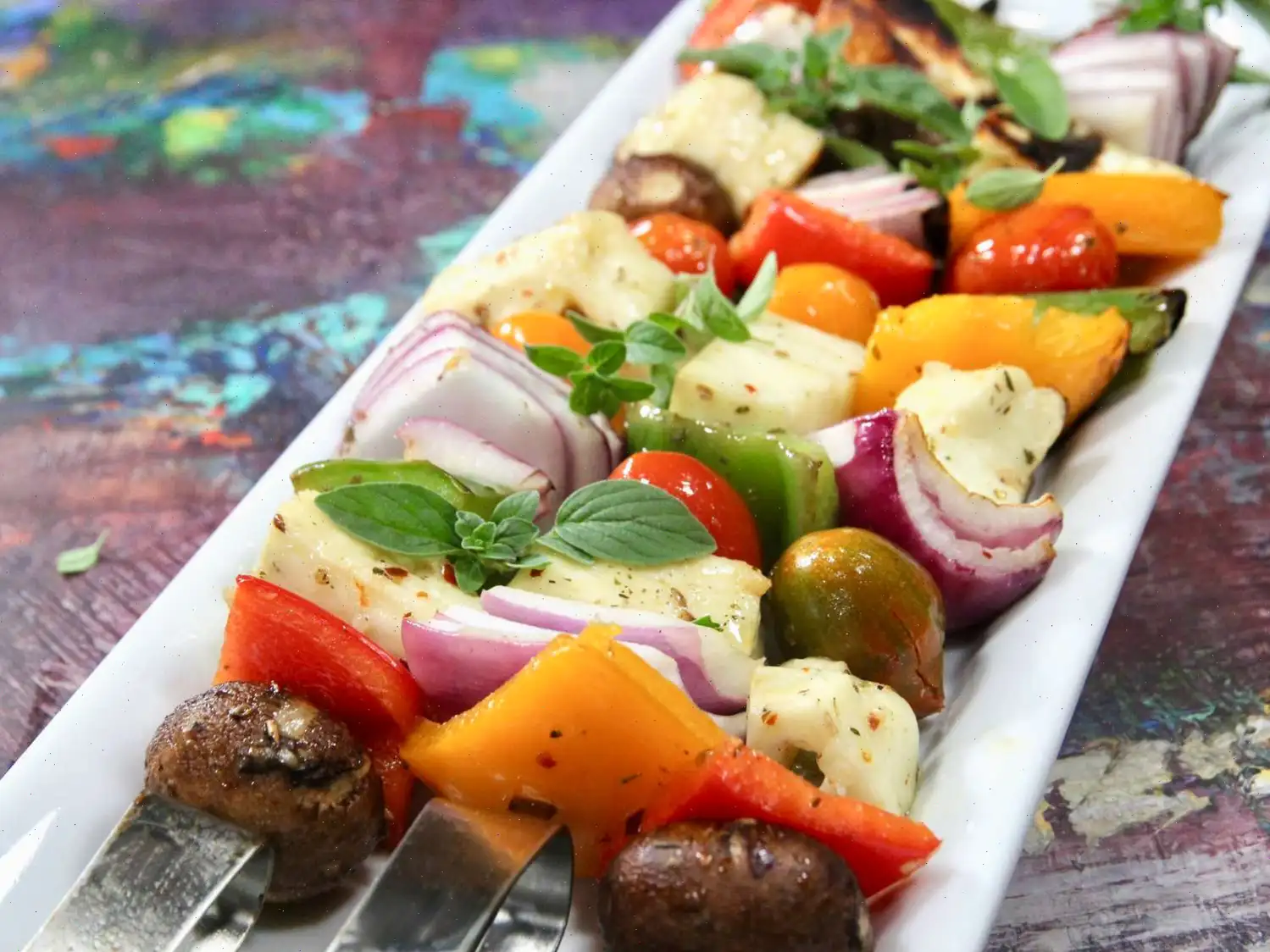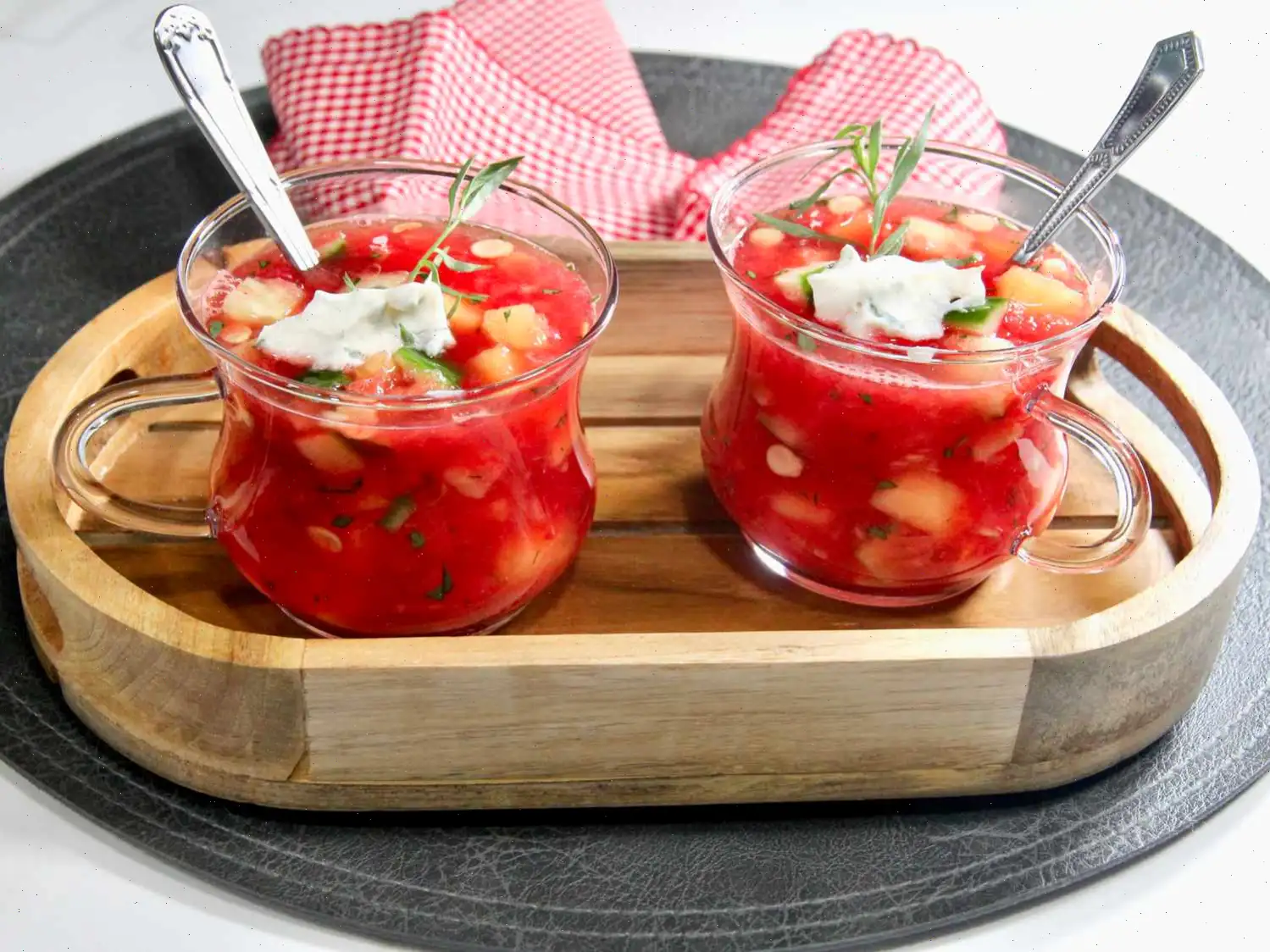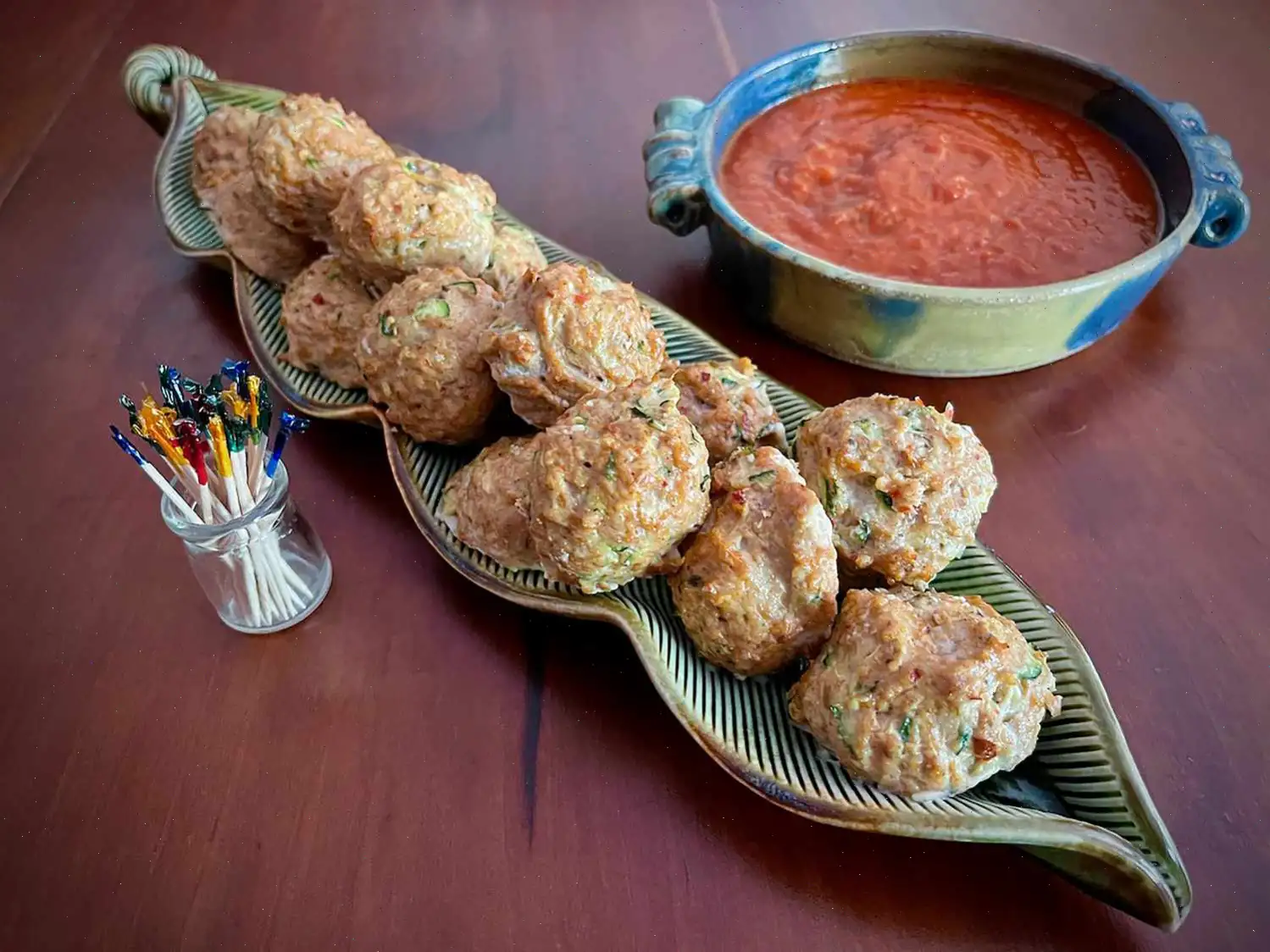
Receta de brochetas de halloumi y verduras
Brochetas de halloumi y verduras son un plato delicioso y fácil de preparar, perfecto para una barbacoa en verano o una cena ligera entre semana. La combinación del queso halloumi salado y las verduras frescas crea una comida sabrosa y satisfactoria. Sigue esta receta sencilla para hacer estas brochetas que seguro serán un éxito con tu familia y amigos.
Brochetas de Halloumi con Verduras Asadas
Un delicioso y saludable plato de brochetas con halloumi y verduras asadas, ideal para una comida ligera o una parrillada en familia. Este plato es fcil de preparar y perfecto para disfrutar de una mezcla de sabores mediterrneos frescos y sabrosos.
Ingredientes:
- 3 cucharadas de aceite de oliva extra virgen
- 2 cucharadas de jugo de limn fresco
- 2 dientes de ajo, finamente picados
- 1 cucharadita de organo seco
- 1/4 cucharadita de hojuelas de chile rojo (ajustar al gusto)
- 225 gramos de queso halloumi
- 1 pimiento rojo grande o de cualquier otro color
- 1/2 cebolla roja, pelada y cortada
- 8 championes cremini, sin tallos
- 8 tomates cherry o uva
Instrucciones:
- En un tazn pequeo, mezcla el aceite de oliva, el jugo de limn, el ajo picado, el organo y las hojuelas de chile. Revuelve bien hasta obtener una marinada aromtica.
- Seca el queso halloumi con papel absorbente y crtalo en cubos de aproximadamente 2.5 cm de ancho para que sea fcil de ensartar.
- Corta el pimiento y la cebolla en trozos ligeramente ms grandes que los cubos de halloumi para que se cocinen de manera uniforme.
- En un bol grande, coloca el halloumi, el pimiento, la cebolla, los championes y los tomates. Vierte la marinada sobre estos ingredientes y mezcla con suavidad para que todo se impregne bien. Deja reposar durante al menos 30 minutos para que absorban los sabores.
- Si ests utilizando brochetas de madera, sumrgelas en agua durante 30 minutos antes de usarlas para evitar que se quemen al asarlas.
- Ensarta el halloumi y las verduras alternando en las brochetas, reservando un poco de la marinada para pincelar durante la coccin.
- Precalienta la parrilla a fuego medio-alto y unta las rejillas con un poco de aceite para evitar que se peguen los ingredientes.
- Coloca las brochetas sobre la parrilla y cocnalas durante unos 6-8 minutos, girndolas a mitad de coccin y pincelando con la marinada reservada para darles ms sabor.
- Retira las brochetas del fuego cuando las verduras tengan marcas doradas y el halloumi est suave y ligeramente dorado. Srvelas calientes.
Consejos del chef:
- Corta el halloumi en trozos un poco ms pequeos que las verduras para evitar que entren en contacto directo con la parrilla, lo que ayudar a que no se pegue y se cocine de manera ms uniforme.
- Si prefieres un sabor ms intenso, puedes agregar ms hojuelas de chile o incluso un toque de pimienta negra molida a la marinada.
Valor nutricional por porcin (para 3 personas):
- Caloras: 386
- Grasas Totales: 31g (39% del valor diario recomendado)
- Grasas Saturadas: 12g (59% del valor diario recomendado)
- Colesterol: 60mg (20% del valor diario recomendado)
- Sodio: 480mg (21% del valor diario recomendado)
- Carbohidratos: 11g (4% del valor diario recomendado)
- Fibra Diettica: 2g (8% del valor diario recomendado)
- Azcares: 4g
- Protenas: 19g (37% del valor diario recomendado)
- Vitamina C: 62mg (69% del valor diario recomendado)
- Calcio: 409mg (31% del valor diario recomendado)
- Hierro: 2mg (9% del valor diario recomendado)
- Potasio: 375mg (8% del valor diario recomendado)
Disfruta de estas sabrosas brochetas llenas de sabor mediterrneo! Son perfectas para una comida ligera, una parrillada o como acompaamiento en tu prxima reunin.
El halloumi, ingrediente principal de este colorido plato, tiene una historia rica que se remonta a Chipre, donde se ha elaborado durante siglos. Tradicionalmente, se hace con una mezcla de leche de cabra y oveja, y su alto punto de fusin lo hace ideal para asar o frer sin que se derrita. La combinacin con verduras frescas como pimientos, cebollas, championes y tomates refleja las tradiciones culinarias mediterrneas, que destacan por sabores vibrantes e ingredientes simples y saludables.
Esta receta transforma la experiencia clsica del halloumi en un plato moderno y accesible, perfecto para sesiones rpidas de parrilla o cocina al aire libre.
Variaciones Regionales
Aunque el halloumi se origin en Chipre, su popularidad se ha extendido por todo el Mediterrneo y ms all. En Grecia, a veces se acompaa con hierbas como organo y tomillo, mientras que en la cocina del Medio Oriente puede servirse con melaza de granada o zumaque. En adaptaciones occidentales contemporneas, los pinchos de halloumi suelen incluir una mezcla de verduras coloridas y un aderezo de limn y aceite de oliva, resaltando tanto la frescura como la presentacin visual.
La flexibilidad de los ingredientes permite variaciones segn la temporada: calabacn en verano o pimientos asados en meses ms fros, por ejemplo.
Caractersticas Distintivas
Los pinchos de halloumi se destacan frente a otros pinchos de queso o verduras gracias a la textura nica del queso. A diferencia de la mozzarella, que se derrite fcilmente, el halloumi mantiene su forma al calentarse, ofreciendo un bocado firme y ligeramente crujiente. Comparado con los pinchos de tofu, el halloumi aporta un sabor naturalmente salado y una sensacin en boca ms rica, sin necesidad de condimentos fuertes.
La combinacin de verduras ligeramente carbonizadas y halloumi a la parrilla crea un equilibrio perfecto entre sabores ahumados, salados y frescos, diferencindose de los kabobs tradicionales o los pinchos solo de verduras.
Ocasiones Tpicas para Servirlos
Estos pinchos se sirven comnmente en barbacoas, cenas informales y reuniones de inspiracin mediterrnea. Funcionan perfectamente como aperitivo o como parte de un plato principal ligero, acompaados de ensaladas, cuscs o panes planos. Su atractivo visual los hace ideales para fiestas, y la sencillez en la preparacin permite cocinarlos rpidamente en parrillas al aire libre o sartenes de grill interiores.
En restaurantes, los pinchos de halloumi a menudo se presentan como parte de mens estilo tapas o platos de mezze, fomentando la comida compartida y la experiencia comunitaria.
Datos Interesantes
- El halloumi se conserva tradicionalmente en salmuera, lo que contribuye a su sabor salado caracterstico y a su larga duracin.
- Se cree que la palabra "halloumi" deriva del rabe "allm", que significa "queso de leche de oveja".
- Debido a que no se derrite fcilmente, el halloumi puede asarse, frerse o incluso hornearse sin perder su forma.
- En Chipre, el halloumi se suele servir con sanda, creando una combinacin clsica de dulce y salado.
- Los pinchos de verduras con halloumi no solo son atractivos visualmente, sino que tambin ofrecen un equilibrio de protenas, fibra y vitaminas esenciales.







